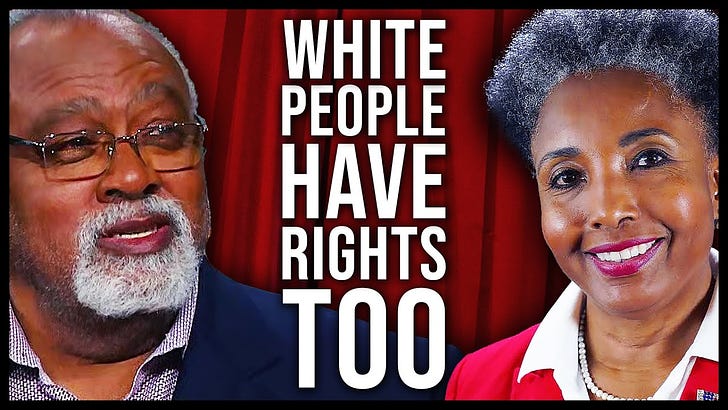The Supreme Court has ruled that affirmative action as it’s currently practiced discriminates on the basis of race and therefore runs afoul of the 14th Amendment. My guest this week, political scientist Carol Swain, argues that some DEI policies implemented by private businesses do the same. I’m not so sure, though. In the following clip, we debate the issue.
This is a clip from the episode that went out to paying subscribers on Monday. To get access to the full episode, as well as an ad-free podcast feed, Q&As, and other exclusive content and benefits, click below.





"The DEI folks seem to think they can say whatever they want, under the rubric of 'white people are bad' or some such." This is, in my view, an absolute fact. It is also somewhat unavoidable in the current context. I tend to agree with Ms. Swain in large part, on this narrow issue. I agree with Mr. Loury, in the fact that it is not unconstitutional. It, DEI training, could be worthless--which is another discussion--but it should not be used as an excuse to attack others.
Slavery is one thing that the Constitution got wrong from the beginning, and we're still living with this burden. The "Articles of Confederation" was the original organizing document after the American Revolution. There was so much wrong with the Articles that it had to be scrapped. The US Constitution took its place. The reason I bring this up is that the Articles of Confederation were silent on the issue of slavery, and during that time, six black slaves sued for their freedom and won.
The Constitution had slavery written in, even though most of the Founders either owned slaves they were NOT allowed to free, or didn't own slaves at all. The fact that the law counted each black slaves as 2/3 of a person. This gave their white slave owners a vested interest in keeping slaves, and providing a political incentive for the continued owning and multiplying of slaves. This was an unspeakable injustice, especially since the incentive built in, made the original end-date of slavery in the Constitution a joke.
Now the argument shifting to prevent private owners from exercising private preferences or prejudices is backed by 247 years of government meddling in private decisions.
The decision-making constraints on government are different than on private individuals and businesses. Rightly, any person should have a right to choose his or her friends, business associates and employees.
The simple rule is that governments, since they hold the objective use of force to maintain law and order for all the people over an area of land called a country, cannot be allowed or encouraged to discriminate between groups of people by race, religion, sex, creed, etc. In the United States the rule of the Founders has been "innocent until proven guilty." Government institutionalizing racial preferences, no matter who is being preferred are an anathema to justice.
It would be refreshing if people would be consider that now is the time to privatize preferences, and make the clear distinction between government financed livelihoods (where discrimination is banned) and privately financed livelihoods, where individual preferences (aka discrimination) is treated as an aspect of cultural evolution and individual rights. Sometimes, we need to assume that people do not need new laws, especially laws which remove private choice and infantilize a population under the benevolent dictatorship of a Nanny State.